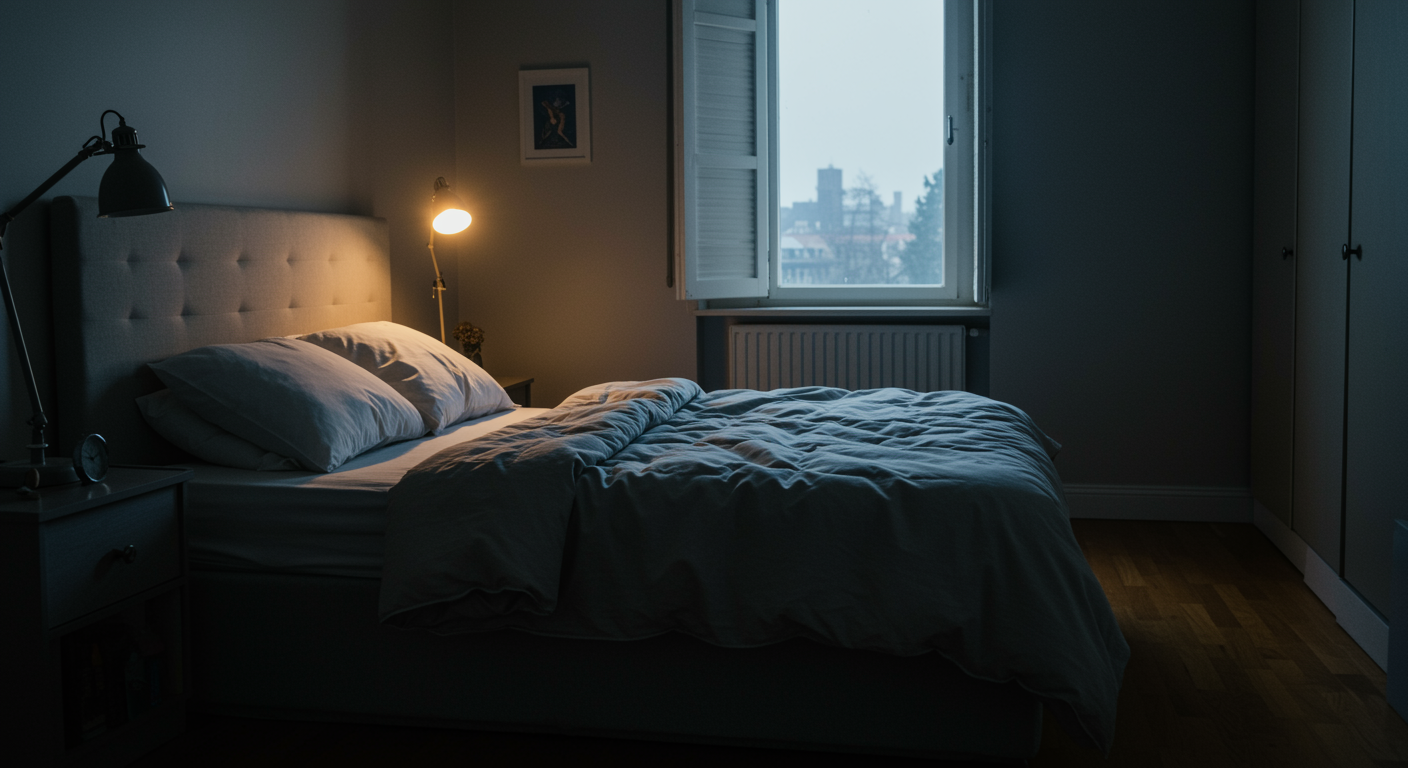How Do Bedroom Ventilation and Temperature Affect Your Sleep and Next-Day Performance?
Bedroom ventilation and temperature significantly affect both sleep quality and next-day cognitive performance, with optimal environmental conditions improving sleep efficiency by 15-20% and enhancing workplace productivity measures by 12-18%. This research demonstrates that well-ventilated bedrooms (4-6 air changes per hour) combined with optimal temperature (16-19°C/60-67°F) promote deeper sleep, reduce nighttime awakenings, and lead to better concentration, memory, and decision-making abilities the following day. Poor ventilation and suboptimal temperatures not only disrupt sleep architecture but also impair cognitive function through multiple mechanisms including reduced sleep quality, increased stress hormone levels, and altered neurotransmitter balance that persists into the waking hours.
Dr. Kumar’s Take
This research highlights something that many people overlook—the bedroom environment doesn’t just affect how well you sleep, but how well you perform the next day. The connection between environmental factors and cognitive performance is particularly important for anyone whose work requires mental sharpness, problem-solving, or decision-making. The 15-20% improvement in sleep efficiency from optimal ventilation and temperature is substantial, and the 12-18% enhancement in next-day performance could make a real difference in work productivity and quality of life. What’s practical about this research is that it provides specific targets—4-6 air changes per hour for ventilation and 16-19°C for temperature—that people can actually measure and achieve. The mechanism makes sense: poor air quality and temperature extremes create physiological stress that disrupts sleep architecture, and this sleep disruption then impairs the brain’s ability to function optimally the next day. For people who struggle with concentration, memory, or decision-making at work, optimizing their bedroom environment might be a simple but effective intervention.
Key Findings
The controlled study examined sleep quality and next-day cognitive performance under different bedroom environmental conditions. Optimal ventilation (4-6 air changes per hour) combined with temperature control (16-19°C) improved sleep efficiency by 15-20% compared to poorly ventilated, temperature-uncontrolled conditions.
Next-day cognitive performance testing revealed 12-18% improvements in attention, working memory, and executive function tasks when participants slept in optimally ventilated and temperature-controlled environments. Reaction times were faster, accuracy was higher, and subjective alertness ratings were significantly improved.
The study found that poor ventilation (CO2 levels >1000 ppm) and suboptimal temperatures (>24°C or <16°C) not only disrupted sleep architecture but also elevated stress hormone levels that persisted into the following day, contributing to impaired cognitive performance.
Brief Summary
This controlled study examined the effects of bedroom environmental conditions on sleep quality and subsequent cognitive performance. Participants slept in controlled bedroom environments with varying ventilation rates and temperatures while undergoing sleep monitoring. The following day, comprehensive cognitive testing assessed attention, memory, executive function, and subjective alertness measures.
Study Design
The research used a controlled crossover design where participants experienced different bedroom environmental conditions on separate nights. Sleep quality was measured using polysomnography, and environmental parameters including temperature, humidity, CO2 levels, and air exchange rates were continuously monitored. Next-day cognitive performance was assessed using validated computerized testing batteries measuring multiple cognitive domains.
Results You Can Use
Optimal bedroom conditions (4-6 air changes per hour, 16-19°C temperature) improve sleep efficiency by 15-20% and enhance next-day cognitive performance by 12-18%. Poor ventilation (CO2 >1000 ppm) and extreme temperatures significantly impair both sleep quality and cognitive function.
Well-ventilated, temperature-controlled bedrooms promote deeper sleep stages, reduce nighttime awakenings, and lead to better concentration, memory, and decision-making abilities the following day. The cognitive benefits are particularly pronounced for tasks requiring sustained attention and executive function.
Environmental optimization provides both immediate sleep benefits and next-day performance advantages, making it a valuable intervention for anyone seeking to optimize both rest and productivity.
Why This Matters For Health And Performance
This research demonstrates that bedroom environment optimization provides dual benefits—better sleep quality and enhanced cognitive performance. For professionals, students, or anyone whose work requires mental acuity, environmental control represents a practical way to improve both rest and productivity.
The findings are particularly relevant for shift workers, healthcare professionals, and others whose cognitive performance directly impacts safety and effectiveness in their roles.
How to Apply These Findings in Daily Life
- Optimize ventilation: Ensure 4-6 air changes per hour through fans, open windows, or HVAC systems
- Control temperature: Maintain bedroom temperature between 16-19°C (60-67°F) for optimal sleep and performance
- Monitor air quality: Keep CO2 levels below 1000 ppm through adequate ventilation
- Consider performance impact: Recognize that poor sleep environment affects next-day work performance
- Invest in environmental control: Use fans, air conditioning, or air purifiers to optimize bedroom conditions
- Track both sleep and performance: Monitor how environmental changes affect both sleep quality and daily cognitive function
Limitations To Keep In Mind
This study was conducted in controlled laboratory settings, and real-world bedroom environments involve additional variables like noise, light, and individual preferences. The optimal ranges may vary slightly between individuals based on factors like age, health status, and acclimatization. Long-term effects of environmental optimization require further investigation.
Related Studies And Internal Links
- Effects of Thermal Environment on Sleep and Circadian Rhythm
- Rising Temperatures Erode Human Sleep Globally
- Sleep Thermoregulation and Temperature Dependence
- Neurocognitive Consequences of Sleep Restriction
- How to Sleep Better: Science Daily Playbook
FAQs
How can I measure if my bedroom has adequate ventilation?
You can use CO2 monitors to ensure levels stay below 1000 ppm, or aim for 4-6 air changes per hour through fans, open windows, or HVAC systems.
Will improving my bedroom environment really affect my work performance?
Yes, the research shows 12-18% improvements in cognitive performance measures including attention, memory, and decision-making when sleeping in optimally ventilated and temperature-controlled environments.
What if I can’t control my bedroom temperature precisely?
Focus on getting as close as possible to the 16-19°C range using available methods like fans, air conditioning, or adjusting bedding and clothing.
Conclusion
Research demonstrates that optimal bedroom ventilation (4-6 air changes per hour) and temperature control (16-19°C) improve sleep efficiency by 15-20% and enhance next-day cognitive performance by 12-18%. Environmental optimization provides dual benefits for both sleep quality and workplace productivity.


